4 Tips for Better Medical History Forms.
4 Tips for Better Medical History Forms.
4 Tips for Better Medical History Forms.
Medical history forms are central to patient care, onboarding, and medical administration records. Learn how to make them easier to fill.
Medical history forms are central to patient care, onboarding, and medical administration records. Learn how to make them easier to fill.
Medical history forms are central to patient care, onboarding, and medical administration records. Learn how to make them easier to fill.
Is there a way to make the so-called "dreaded" medical history form more inviting for people to fill out without hesitation? It is easier if you have a form that is quick and engaging. But once that is set in place, people can enjoy filling out medical history forms.
Medical History forms are an integral part of the medical administration record, so without more chit-chat, let's get to the meat and potatoes of medical history forms section by section.
Pre-fill basic info. Build trust at the start.
Entering their primary details like name, age, and phone number is most commonly a user's first interaction with lengthy medical history forms.
Consider pre-filling fields with data you might already have access to from legitimate sources and systems of record. This reduces filling time and heightens the probability of higher completion rates.
Clearly state your data security practices and that your form is HIPAA compliant to ensure that form fillers trust you with their information.

Use the Form UI/UX to your advantage.
Simple details like fonts, colors, and field spacing can impact completion rates, especially for long forms like medical history forms.
Make sure that your medical history forms are easy to fill out and work seamlessly on mobile. Most users will likely first access the form on their phones.
Use a design that is easy on the eyes and jargon-free language, reducing the cognitive load for all form respondents.
Match how your users want to share their information. Offer multi-modal options like uploading documents, writing answers, or recording audio/video.
Experimenting with specialized input types for significant information like date is also advisable. Try a calendar or timeline view, enabling the form filler to respond.

Use conditions and logic to keep it short.
It doesn't have to be voluminous just because it is a medical history form. Be comprehensive without being overwhelming.
Section the form smartly into logical categories of information that must be collected, e.g., medications, surgeries, and immunizations.
Use intelligent conditions and logic to skip irrelevant sections for each individual user. Only get into the specifics under each section.
For example, if the user says “No” to autoimmune conditions, do not show an exhaustive list of autoimmune conditions for them to individually say “No” to.

Collect non-obvious insights. Ask intelligent follow-ups.
Go beyond checklists and ask deeper questions in medical history forms for deeper data.
Include questions about exercise habits, diet, and sleep patterns to get a well-rounded view of well-being.
Ask about genetic disorders, work environment, accident insurance, and potential exposure to toxins or physical risks.
Include questions about stress levels, coping mechanisms, and any history of mental health conditions.
Having these details can better equip you to deliver seamless patient onboarding. Sticking to the "big three" (diabetes, heart disease, cancer) is not enough.

Medical History Forms are never done. Iterate.
Think like a marketer and A/B test your form and actively seek patient and healthcare provider feedback. Regularly refine the question sequence for faster outcomes.
Use online form tools to your benefit. With so many form-building companies right around the corner, online form builders such as JotForm and Gravity Forms offer HIPAA-compliant templates.
Moreover, to start experimenting with AI Forms, check out conversational AI forms, Formless, by Typeform, and WorkHack's fast and powerful AI forms.
Medical history forms are the first step in your patient's journey with your healthcare firm. Streamline your data collection process and patient journey with WorkHack.
Is there a way to make the so-called "dreaded" medical history form more inviting for people to fill out without hesitation? It is easier if you have a form that is quick and engaging. But once that is set in place, people can enjoy filling out medical history forms.
Medical History forms are an integral part of the medical administration record, so without more chit-chat, let's get to the meat and potatoes of medical history forms section by section.
Pre-fill basic info. Build trust at the start.
Entering their primary details like name, age, and phone number is most commonly a user's first interaction with lengthy medical history forms.
Consider pre-filling fields with data you might already have access to from legitimate sources and systems of record. This reduces filling time and heightens the probability of higher completion rates.
Clearly state your data security practices and that your form is HIPAA compliant to ensure that form fillers trust you with their information.

Use the Form UI/UX to your advantage.
Simple details like fonts, colors, and field spacing can impact completion rates, especially for long forms like medical history forms.
Make sure that your medical history forms are easy to fill out and work seamlessly on mobile. Most users will likely first access the form on their phones.
Use a design that is easy on the eyes and jargon-free language, reducing the cognitive load for all form respondents.
Match how your users want to share their information. Offer multi-modal options like uploading documents, writing answers, or recording audio/video.
Experimenting with specialized input types for significant information like date is also advisable. Try a calendar or timeline view, enabling the form filler to respond.

Use conditions and logic to keep it short.
It doesn't have to be voluminous just because it is a medical history form. Be comprehensive without being overwhelming.
Section the form smartly into logical categories of information that must be collected, e.g., medications, surgeries, and immunizations.
Use intelligent conditions and logic to skip irrelevant sections for each individual user. Only get into the specifics under each section.
For example, if the user says “No” to autoimmune conditions, do not show an exhaustive list of autoimmune conditions for them to individually say “No” to.

Collect non-obvious insights. Ask intelligent follow-ups.
Go beyond checklists and ask deeper questions in medical history forms for deeper data.
Include questions about exercise habits, diet, and sleep patterns to get a well-rounded view of well-being.
Ask about genetic disorders, work environment, accident insurance, and potential exposure to toxins or physical risks.
Include questions about stress levels, coping mechanisms, and any history of mental health conditions.
Having these details can better equip you to deliver seamless patient onboarding. Sticking to the "big three" (diabetes, heart disease, cancer) is not enough.

Medical History Forms are never done. Iterate.
Think like a marketer and A/B test your form and actively seek patient and healthcare provider feedback. Regularly refine the question sequence for faster outcomes.
Use online form tools to your benefit. With so many form-building companies right around the corner, online form builders such as JotForm and Gravity Forms offer HIPAA-compliant templates.
Moreover, to start experimenting with AI Forms, check out conversational AI forms, Formless, by Typeform, and WorkHack's fast and powerful AI forms.
Medical history forms are the first step in your patient's journey with your healthcare firm. Streamline your data collection process and patient journey with WorkHack.
Is there a way to make the so-called "dreaded" medical history form more inviting for people to fill out without hesitation? It is easier if you have a form that is quick and engaging. But once that is set in place, people can enjoy filling out medical history forms.
Medical History forms are an integral part of the medical administration record, so without more chit-chat, let's get to the meat and potatoes of medical history forms section by section.
Pre-fill basic info. Build trust at the start.
Entering their primary details like name, age, and phone number is most commonly a user's first interaction with lengthy medical history forms.
Consider pre-filling fields with data you might already have access to from legitimate sources and systems of record. This reduces filling time and heightens the probability of higher completion rates.
Clearly state your data security practices and that your form is HIPAA compliant to ensure that form fillers trust you with their information.

Use the Form UI/UX to your advantage.
Simple details like fonts, colors, and field spacing can impact completion rates, especially for long forms like medical history forms.
Make sure that your medical history forms are easy to fill out and work seamlessly on mobile. Most users will likely first access the form on their phones.
Use a design that is easy on the eyes and jargon-free language, reducing the cognitive load for all form respondents.
Match how your users want to share their information. Offer multi-modal options like uploading documents, writing answers, or recording audio/video.
Experimenting with specialized input types for significant information like date is also advisable. Try a calendar or timeline view, enabling the form filler to respond.

Use conditions and logic to keep it short.
It doesn't have to be voluminous just because it is a medical history form. Be comprehensive without being overwhelming.
Section the form smartly into logical categories of information that must be collected, e.g., medications, surgeries, and immunizations.
Use intelligent conditions and logic to skip irrelevant sections for each individual user. Only get into the specifics under each section.
For example, if the user says “No” to autoimmune conditions, do not show an exhaustive list of autoimmune conditions for them to individually say “No” to.

Collect non-obvious insights. Ask intelligent follow-ups.
Go beyond checklists and ask deeper questions in medical history forms for deeper data.
Include questions about exercise habits, diet, and sleep patterns to get a well-rounded view of well-being.
Ask about genetic disorders, work environment, accident insurance, and potential exposure to toxins or physical risks.
Include questions about stress levels, coping mechanisms, and any history of mental health conditions.
Having these details can better equip you to deliver seamless patient onboarding. Sticking to the "big three" (diabetes, heart disease, cancer) is not enough.

Medical History Forms are never done. Iterate.
Think like a marketer and A/B test your form and actively seek patient and healthcare provider feedback. Regularly refine the question sequence for faster outcomes.
Use online form tools to your benefit. With so many form-building companies right around the corner, online form builders such as JotForm and Gravity Forms offer HIPAA-compliant templates.
Moreover, to start experimenting with AI Forms, check out conversational AI forms, Formless, by Typeform, and WorkHack's fast and powerful AI forms.
Medical history forms are the first step in your patient's journey with your healthcare firm. Streamline your data collection process and patient journey with WorkHack.
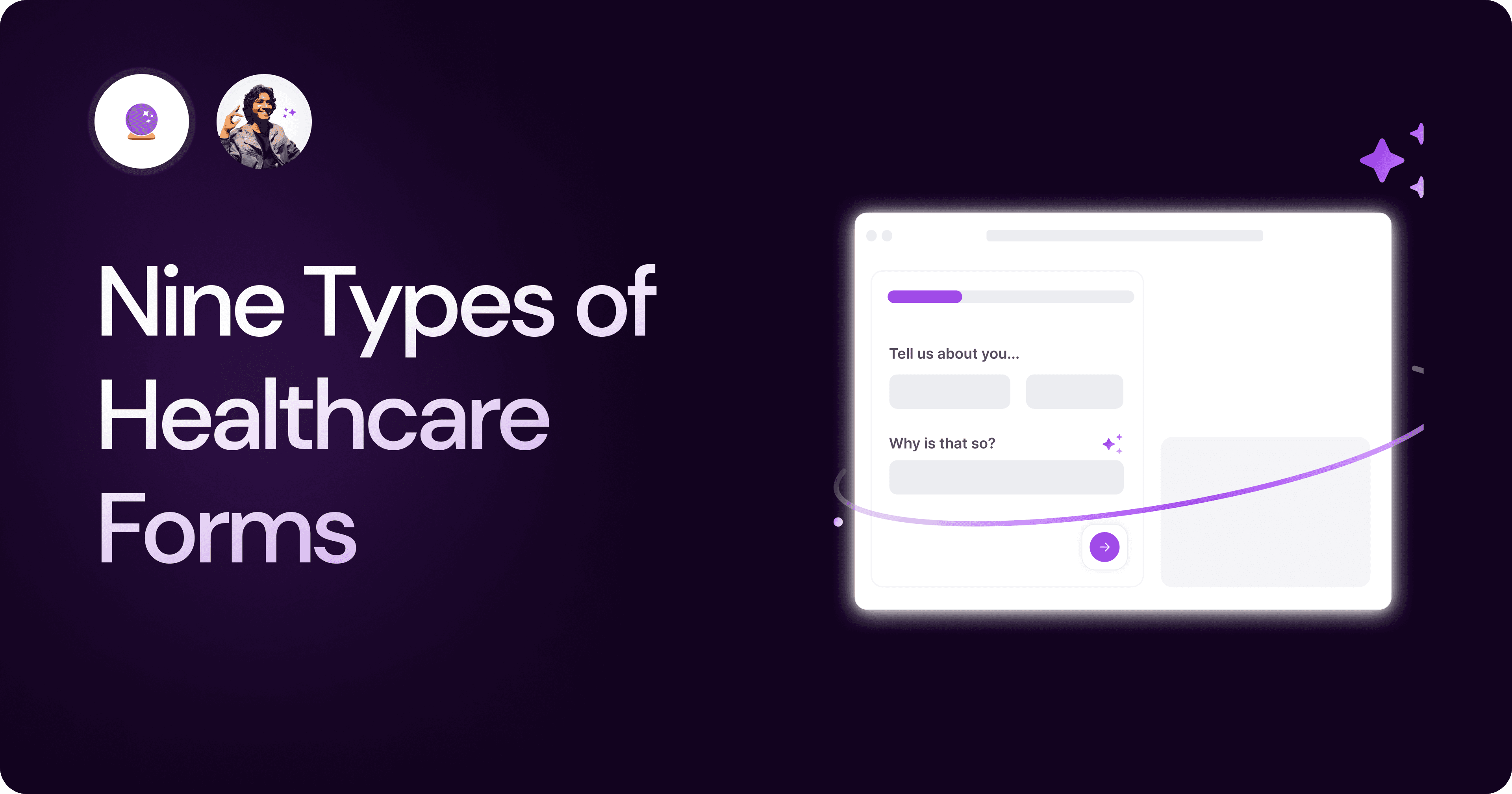
Nine Types of Healthcare and Medical Forms.
Medical forms are a must-have for any healthcare business or practitioner. Learn about the different kinds of medical and healthcare forms.
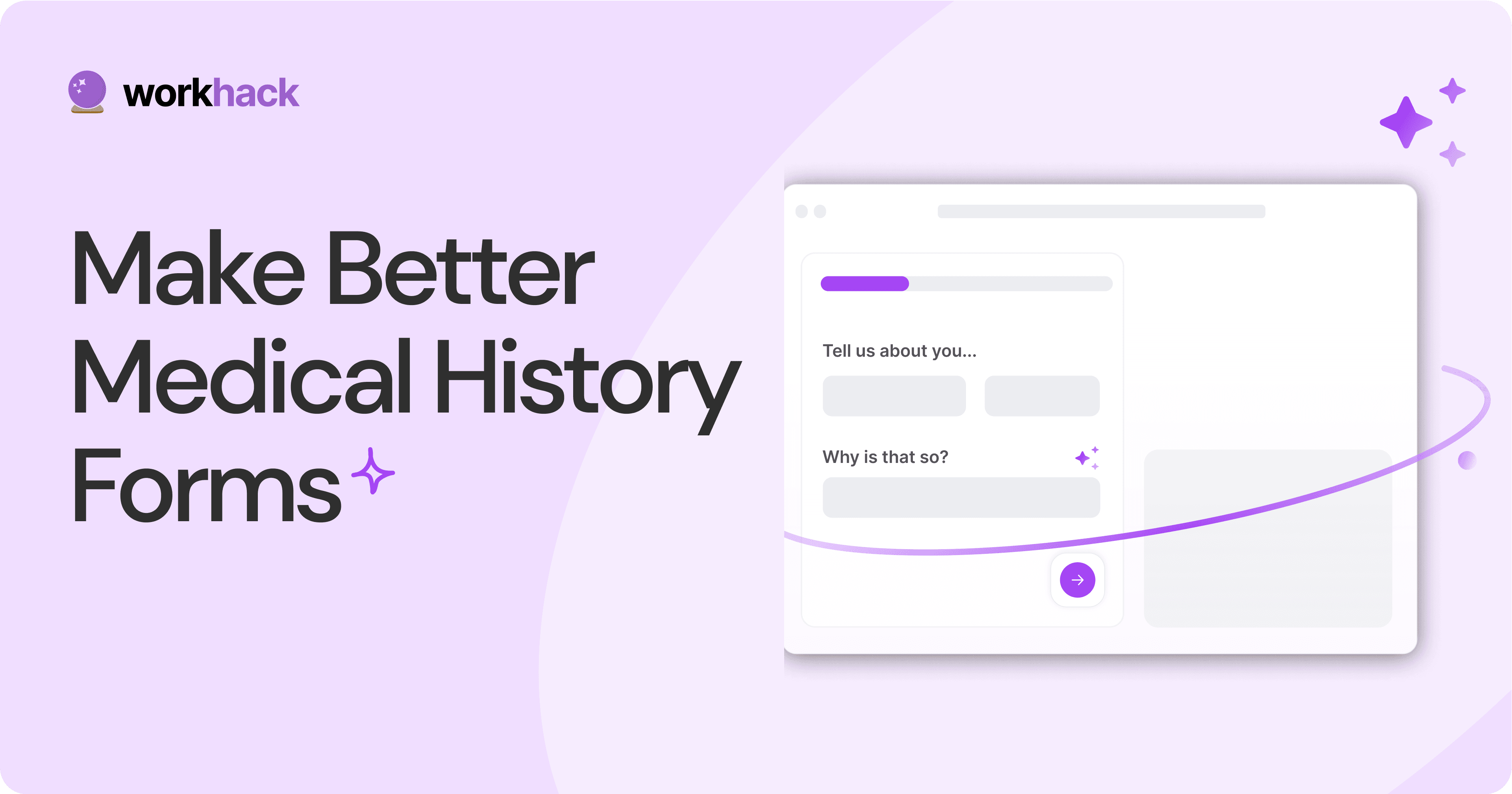
4 Tips for Better Medical History Forms.
Medical history forms are central to patient care, onboarding, and medical administration records. Learn how to make them easier to fill.
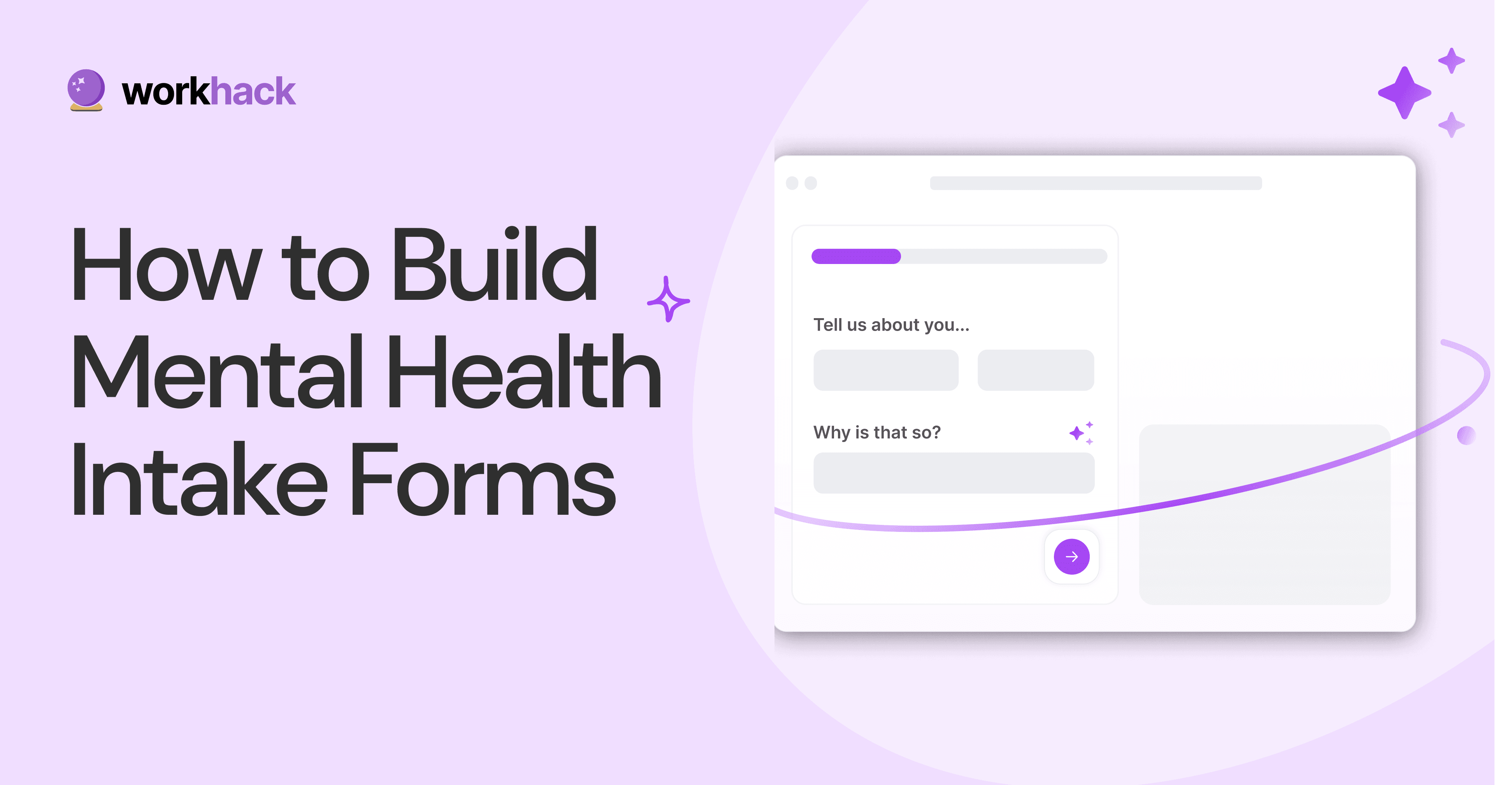
How to Build Mental Health Intake Forms?
Mental health intake forms are not like patient intake forms. Mental health intake forms deal with far more sensitive data and have specific design methods.
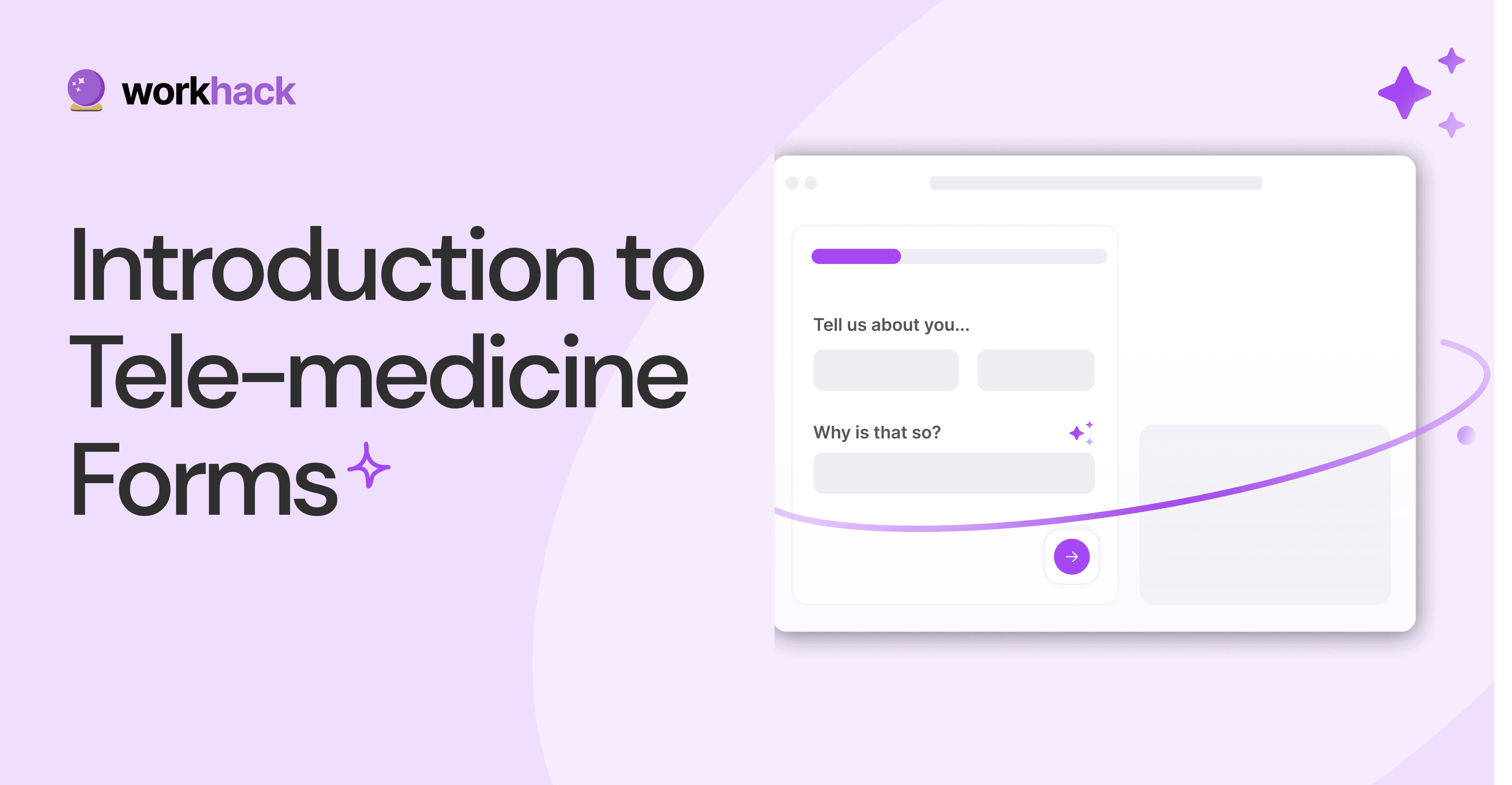
What, Why and How of Telemedicine Forms.
Telemedicine is on the rise and with different form builders out there, which one best suits your needs as a healthcare services provider?
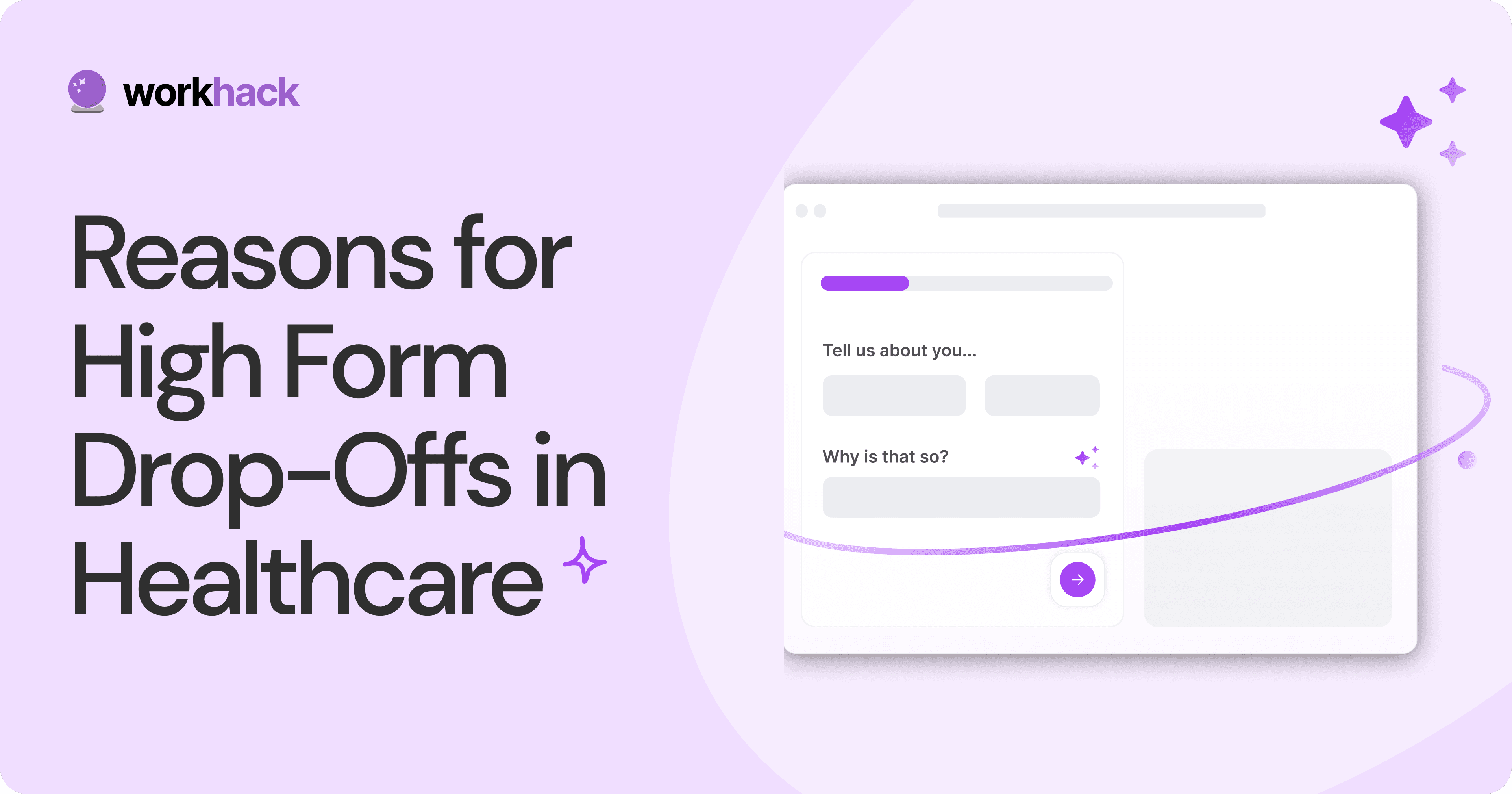
3 Reasons for Major Drop-Offs in Medical Forms.
No matter which healthcare form we pick, there are major drop-off reasons. We shall dive into the top 3 and learn how to resolve them in your next form.
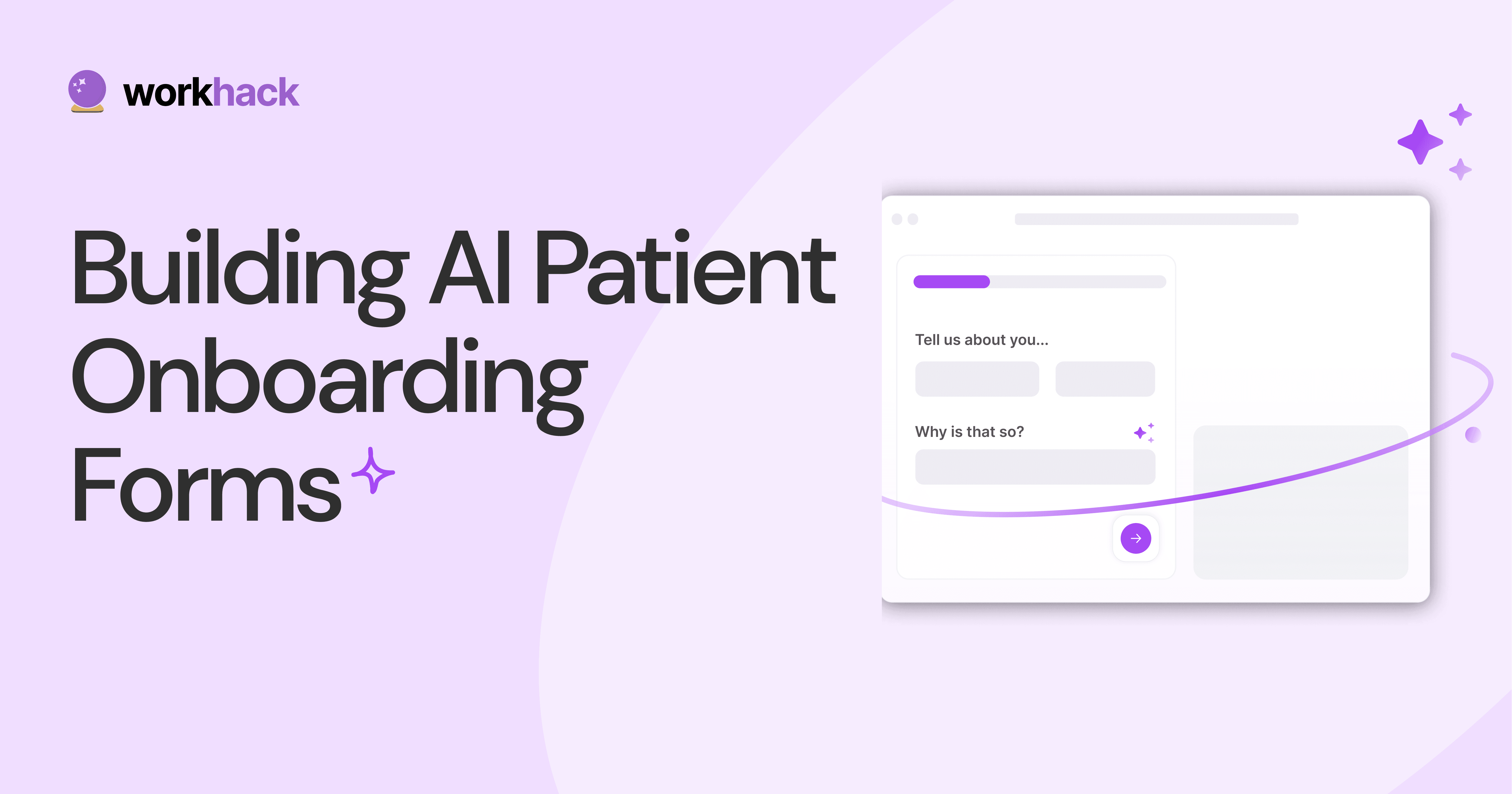
Patient Onboarding Forms - From Click to Clinic.
Patient onboarding forms are the first touchpoint for patients; getting this right for higher conversion rates is a must-have. Learn how to perfect them now.
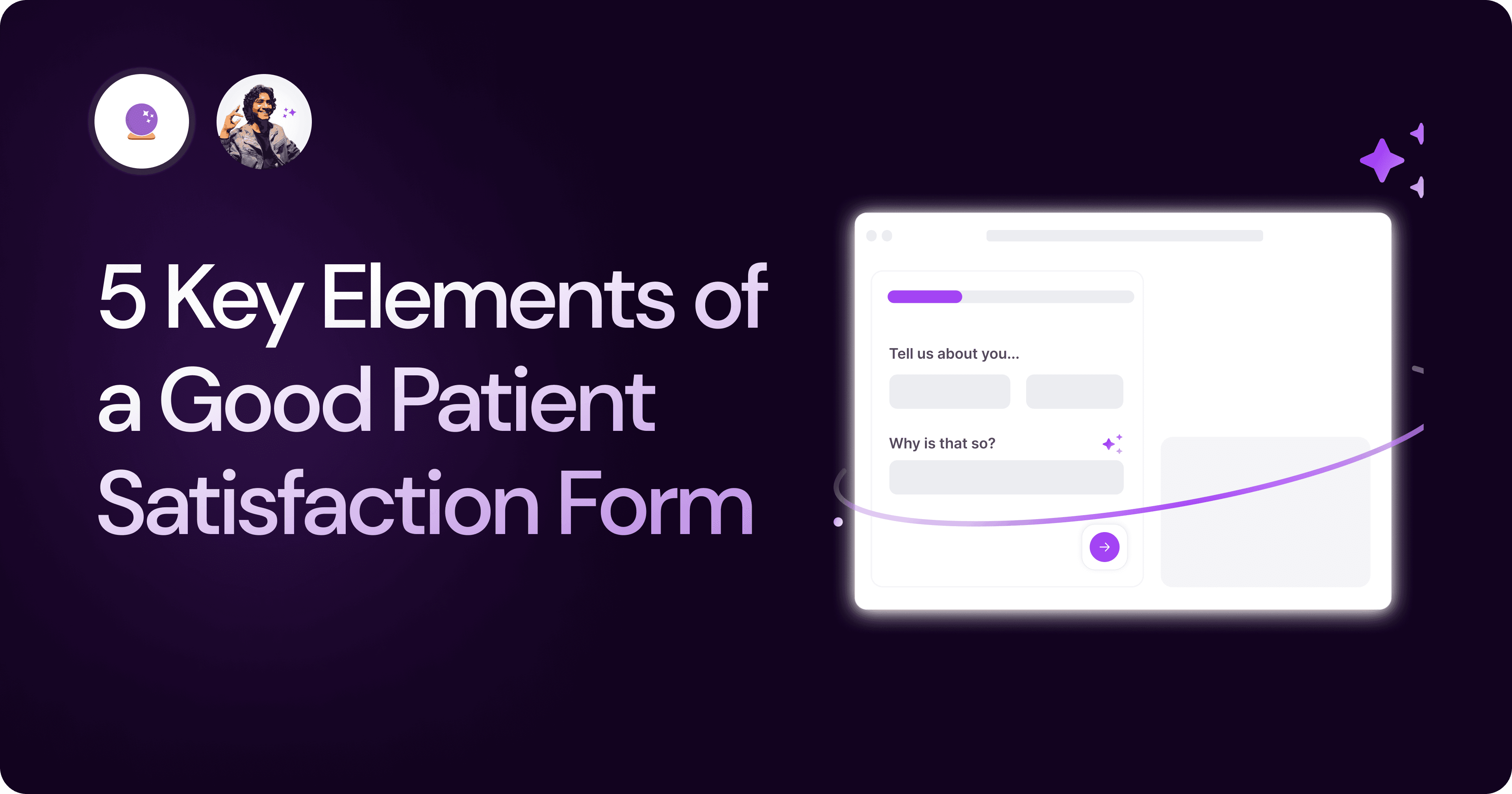
5 Key Parts of a Good Patient Satisfaction Form.
The goal of patient satisfaction surveys is to course-correct the services of a healthcare provider. Patient feedback leads to a culture of patient-centric care.
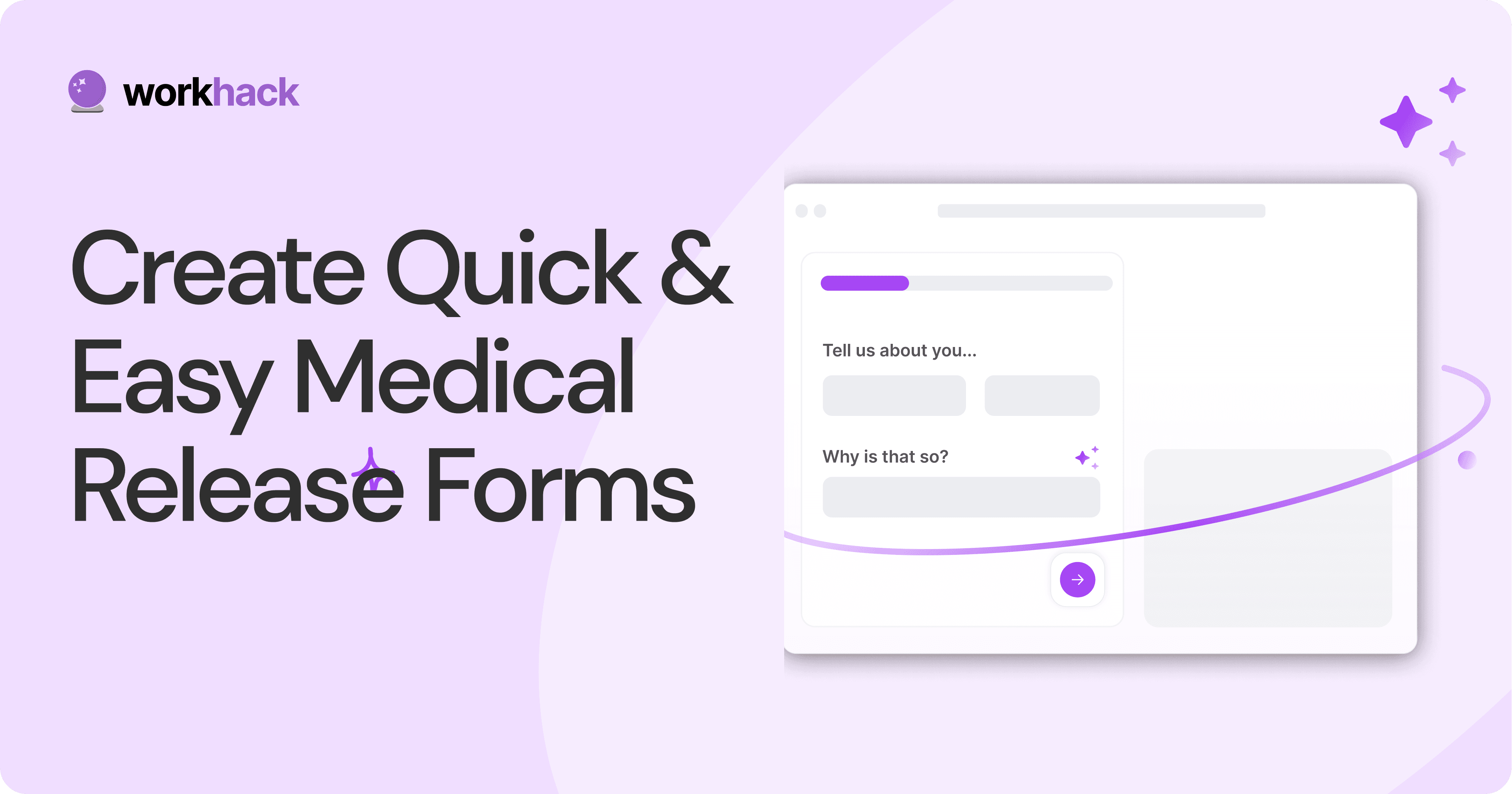
Build Quick and Easy Medical Release Forms.
Every HIPAA-compliant healthcare provider comes across medical release forms that involve details from medical history forms. Can they be shipped fast? Yes.

Nine Types of Healthcare and Medical Forms.
Medical forms are a must-have for any healthcare business or practitioner. Learn about the different kinds of medical and healthcare forms.

4 Tips for Better Medical History Forms.
Medical history forms are central to patient care, onboarding, and medical administration records. Learn how to make them easier to fill.

How to Build Mental Health Intake Forms?
Mental health intake forms are not like patient intake forms. Mental health intake forms deal with far more sensitive data and have specific design methods.

What, Why and How of Telemedicine Forms.
Telemedicine is on the rise and with different form builders out there, which one best suits your needs as a healthcare services provider?

3 Reasons for Major Drop-Offs in Medical Forms.
No matter which healthcare form we pick, there are major drop-off reasons. We shall dive into the top 3 and learn how to resolve them in your next form.

Patient Onboarding Forms - From Click to Clinic.
Patient onboarding forms are the first touchpoint for patients; getting this right for higher conversion rates is a must-have. Learn how to perfect them now.

5 Key Parts of a Good Patient Satisfaction Form.
The goal of patient satisfaction surveys is to course-correct the services of a healthcare provider. Patient feedback leads to a culture of patient-centric care.

Build Quick and Easy Medical Release Forms.
Every HIPAA-compliant healthcare provider comes across medical release forms that involve details from medical history forms. Can they be shipped fast? Yes.

Nine Types of Healthcare and Medical Forms.
Medical forms are a must-have for any healthcare business or practitioner. Learn about the different kinds of medical and healthcare forms.

4 Tips for Better Medical History Forms.
Medical history forms are central to patient care, onboarding, and medical administration records. Learn how to make them easier to fill.

How to Build Mental Health Intake Forms?
Mental health intake forms are not like patient intake forms. Mental health intake forms deal with far more sensitive data and have specific design methods.

What, Why and How of Telemedicine Forms.
Telemedicine is on the rise and with different form builders out there, which one best suits your needs as a healthcare services provider?

3 Reasons for Major Drop-Offs in Medical Forms.
No matter which healthcare form we pick, there are major drop-off reasons. We shall dive into the top 3 and learn how to resolve them in your next form.

Patient Onboarding Forms - From Click to Clinic.
Patient onboarding forms are the first touchpoint for patients; getting this right for higher conversion rates is a must-have. Learn how to perfect them now.

5 Key Parts of a Good Patient Satisfaction Form.
The goal of patient satisfaction surveys is to course-correct the services of a healthcare provider. Patient feedback leads to a culture of patient-centric care.

Build Quick and Easy Medical Release Forms.
Every HIPAA-compliant healthcare provider comes across medical release forms that involve details from medical history forms. Can they be shipped fast? Yes.

Nine Types of Healthcare and Medical Forms.
Medical forms are a must-have for any healthcare business or practitioner. Learn about the different kinds of medical and healthcare forms.

4 Tips for Better Medical History Forms.
Medical history forms are central to patient care, onboarding, and medical administration records. Learn how to make them easier to fill.

How to Build Mental Health Intake Forms?
Mental health intake forms are not like patient intake forms. Mental health intake forms deal with far more sensitive data and have specific design methods.

What, Why and How of Telemedicine Forms.
Telemedicine is on the rise and with different form builders out there, which one best suits your needs as a healthcare services provider?

3 Reasons for Major Drop-Offs in Medical Forms.
No matter which healthcare form we pick, there are major drop-off reasons. We shall dive into the top 3 and learn how to resolve them in your next form.

Patient Onboarding Forms - From Click to Clinic.
Patient onboarding forms are the first touchpoint for patients; getting this right for higher conversion rates is a must-have. Learn how to perfect them now.

5 Key Parts of a Good Patient Satisfaction Form.
The goal of patient satisfaction surveys is to course-correct the services of a healthcare provider. Patient feedback leads to a culture of patient-centric care.

Build Quick and Easy Medical Release Forms.
Every HIPAA-compliant healthcare provider comes across medical release forms that involve details from medical history forms. Can they be shipped fast? Yes.
Subscribe to stay updated.
Subscribe to stay updated.
Subscribe to stay updated.
HC

HC

HC

HC

70+ people from across industries read our emails.
HC

HC

70+ people from across industries read our emails.
HC

HC

HC

70+ people from across industries read our emails.




Bangalore, India / San Francisco, US
WorkHack Inc. 2023
Bangalore, India
San Francisco, US
WorkHack Inc. 2023
WorkHack Inc. 2023
Bangalore, India / San Francisco, US
WorkHack Inc. 2023
Bangalore, India / San Francisco, US




